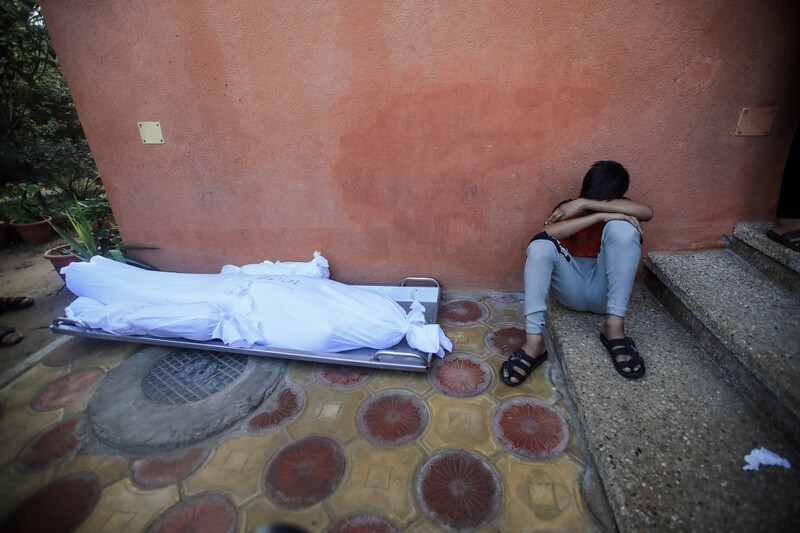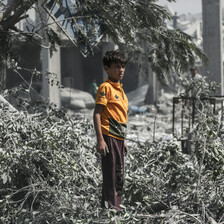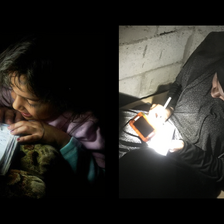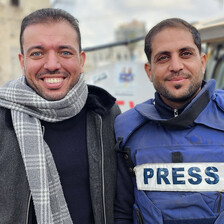The Electronic Intifada 19 October 2024

Every person killed in Gaza was someone’s everything.
ActiveStillsI have buried a friend’s charred remains, seen orphaned boys and girls become guardians to their siblings and witnessed parents carrying their children’s remains in plastic bags for burial, unsure if all the body parts belong to their son or daughter.
I have also witnessed a hospital be turned into a makeshift military base and another a cemetery. I know of survivors who have succumbed to infections from minor cuts, as the entry of essential antibiotics into Gaza is arbitrarily banned by Israel. Gaza is filled with the scent of blood, with many suffering from severe injuries, amputated limbs and trauma.
Ordinary civilians have repurposed abandoned Israeli military crates used to carry ammunition to kill Palestinians as firewood for cooking, with scarcely any fuel entering Gaza. We have turned our cars into homes, tarpaulin tents into schools and clinics, mattresses into stretchers and escaped to overcrowded UNRWA schools in search of safety and refuge, only for these shelters to be bombed.
As we continue to adapt, we are all becoming the “living embodiment of pending funerals,” as I heard a grieving mother say.
Trauma and helplessness
Wounded, exhausted and bruised, I dare not complain when I see young children carrying heavy containers of water over long distances, collecting firewood for cooking and selling items on the streets to survive.
From nervousness and bed-wetting to serious trauma, the children of Gaza are going through a lot. In the words of the UN Population Fund’s Dominic Allen, speaking about newborn babies dying due to low birthweight in Gaza, “mothers should wrap their arms around their children. These children should not be wrapped in body bags.”
All parents in Gaza feel a profound sense of helplessness, even the most resilient, and the psychological toll affects everyone. For the last 17 years – not only the past 12 months – we have been confined, starved, bombed and unjustly blamed for the injustice we endure.
It is wrong to claim nothing has changed during this period. The situation continues to deteriorate.
Gaza, which was and still is the world’s largest open-air prison, has now become a labyrinth of death. Prior to 7 October, we took the chirping of birds overhead for granted. Now, we have grown numb to the constant noise of surveillance drones hovering above us.
In the last 12 months, we have seen the value of a human life be reduced to a flour bag, sometimes even less. The world cared about global trade via the Red Sea over the lives of the more than 42,500 human beings killed in Gaza.
Given such, we see decapitated children day after day, some crushed by buildings, others split open by shrapnel.
Every person killed was someone’s everything.
It is not surprising that the two most common phrases heard across Gaza are “can anybody hear me?” and “where should we go?”
Surviving starvation
Many of us in Gaza’s north have had to survive by eating leaves and snails. Others in the south make do with cans of tasteless fava and kidney beans or expired food.
Aid agencies call it a famine. It should be called what it truly is: deliberate starvation. It is as stark as white flour, though I have seen hungry children sifting through flour mixed with sand and debris. These children are the fortunate ones.
Others in the north have sifted through insect-infested corn grains and rabbit, donkey and pigeon feed and have ground livestock fodder into flour to make something resembling bread. According to the UN Office for the Coordination of Humanitarian Affairs, there are many families in Gaza eating only one meal every two or three days because not enough aid is getting through. Oxfam meanwhile said in April that Palestinians in northern Gaza were consuming a mere 245 calories per day – just over 10 percent of the 2,100 calories needed per day – for months on end.
Hundreds of 18-wheeler trucks loaded with humanitarian aid have been lined up for miles just outside Gaza, waiting for weeks for Israeli permission to enter. Far-right Israeli groups have physically blocked aid from reaching Gaza and have attacked and looted trucks they believe are transporting assistance.
These individuals have received tax-deductible donations from the United States and Israel while people sending money to Gaza to support Palestinians enduring a genocide face restrictions, including more than 20 percent of their remittances being deducted in extortionist bank and money lender fees.
Ordinary Gazans I know are concerned with surviving food shortages, the collapsed health system, flowing sewage, waste buildup and freezing temperatures – not financing terror or laundering money. Yet the inhumane siege, blockade and debilitating sanctions disproportionally affect ordinary Palestinians the most.
Gaza desperately needs chlorine tablets to purify drinking water as well as medical aid. But more urgently, the people of Gaza desperately need water, flour, eggs and vegetables – and not just vitamin-enriched date bars and canned food nearing their expiration dates.
I have spent many long nights waiting in queues at bakeries, flour distribution centers, partially functioning water wells and aid points where groups offer the same repetitive food parcels.
But I am more than just a statistic. Like 2.3 million other Gazans, I have a family, parents, children, siblings, memories, pain, emotions and a home – albeit now in the form of rubble.
I am too exhausted to ask when this will all end. I am demanding that this end. Now.
Asem Alnabih is an engineer and PhD researcher, currently based in Gaza City, north Gaza Strip. He serves as the spokesperson for Gaza Municipality and has written for many platforms in both Arabic and English.





